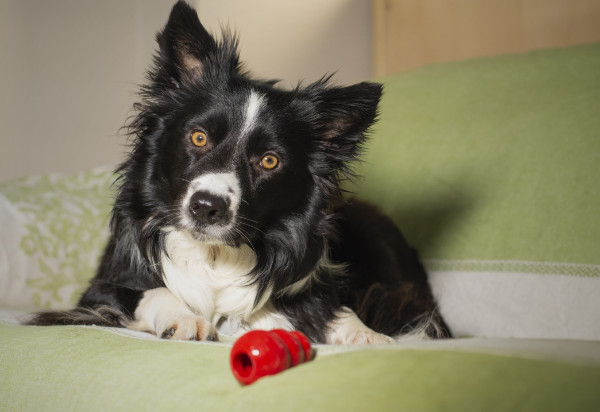Interested in Fostering? Protect Your Foster Dog – And Your Heart
In the April 2020 issue, we published an article by WDJ Training Editor Pat Miller, CCBC-KA, CPDT-KA, about fostering dogs and puppies. Pat has often fostered dogs during her long career in both animal shelters and as a professional dog trainer, and she’s also the author of a great book on the topic, How to Foster Dogs: From Homeless to Homeward Bound.
In both the article we published and her book, Pat mentions some of the potential hazards of fostering for the foster provider, and offers questions that a person should ask before agreeing to foster for an organization that is new to them. I had to pull out that article, and review those questions in light of the experience that one of my friends is having right now as a foster provider for an organization that both of us were only vaguely familiar with. The part I wanted to review was this question, among a list of questions that Pat recommends a potential foster provider asks before taking a dog to foster:
* How does the adoption process work? Are you, the foster parent, allowed to be a part of that process? (The answer to this one should be “yes.”) Are potential adopters carefully screened? Do you get veto power if you think the prospective family is not appropriate for your foster? Are the dogs adopted directly from your home, or do they have to go back to a shelter or kennel?
There aren’t necessarily right or wrong answers to these questions – just answers that will help you decide if this is an organization you can work with.
I’ve been fostering for the same organization for a long time, my local shelter. I know and trust the manager of the shelter well, and she knows and trusts me. When I foster a litter of puppies for the shelter, I generally raise them to a certain age, and then they go to the shelter to get adopted; I don’t have any say in who gets to adopt them. I could have input, but by and large, I trust the shelter’s own screening process to ensure they all go to qualified homes. If I were more involved, it would just muck up and delay the process.
But when I foster an adolescent dog or a senior dog or a dog with health or behavior issues, I invariably have the dog for a longer period of time, and form some opinions about the kind of home and person where that dog should be placed in order to thrive and shine. In these cases, I almost always either promote the dog to my own network of friends (and their friends) and work to make sure that any prospective adopter is really suited to the dog and vice versa, or I work closely with the shelter to meet any potential adopter they find for the dog, and discuss what I know and have experienced about the dog with them.
A great foster provider
My good friend is currently fostering a dog with special medical needs. This is what we know: The dog, a little over a year old, came into the rescue with a broken leg. She had a limb-saving surgery that failed and needed to be repeated. She was briefly in a foster home that turned out to be unsuitable; she is young and playful and there was another young and playful dog in the household, and they wanted to play. The risk of her reinjuring the leg and necessitating the removal of the leg was high. So that foster person asked my friend if she could foster the dog post-surgery until she was healed and ready for placement. My friend agreed, as she has experience with rehabbing her own dog following ACL surgery and is currently working from home.
The dog is very sweet. She’s also very energetic and wants nothing more to do than run and play. She had to spend the first few weeks under the influence of calming medications and went outdoors only on a leash. She weighs around 50 pounds and is strong, and knows nothing about good leash manners (or much else), so my friend has been using a harness to walk her, and has been teaching her some basic good manners: to not pull, to wait at doors, sit and down on cue, etc.
My friend has also been working from home, so she can see how bored and restless the dog is, and she has endeavored to give the dog lots of enriching games and food puzzles to play with. She freezes bits of hot dog and cheese in blocks of ice and lets her enjoy them in a playpen on her shady lawn. She moves the playpen from one location to another during the day, giving the dog changes of scenery – because if she’s left outside for very long by herself, she barks and barks. My friend serves the dog all her meals in Kongs and slow feeders, for enrichment and stimulation.
And, of course, my friend has gotten very attached to the dog – but from the get-go, she has been steeling her heart against the idea of adopting the dog herself. She has an older dog who has had multiple lameness issues for years, and she misses having an utterly sound, healthy dog to take on long walks and hikes. She doesn’t want to hasten her own dog’s death, of course, but she also has been looking forward to the day she can adopt a young, 100% sound dog without medical issues or concerns.
So my friend has had the dog for over two months; she’s healed! She hasn’t heard one word from the rescue group, which is strange, but it sure seems like it’s time to make contact. My friend calls the person who recruited her for the fostering task, who is a co-founder of a local nonprofit animal rescue group, and who, presumably, was the legal owner of the dog. She was saying, hello! The dog is doing great, and what’s the plan for finding her a home?
Whoops! That person told my friend that it was another local group who really owns the dog. Oh boy. Okay.
A not-so-great rescue group
My friend calls that group – and it seems to be a minor surprise to them that the dog still exists. Okay, there is a pandemic going on; everyone is a bit stressed. Once they recover, they say someone will get back to my friend. There was someone a while back who was interested in the dog….
When my friend reports this to me, we are both perplexed. If the rescue group had someone who was interested in the dog months ago, why wasn’t that person hosting the dog during rehab? Maybe they work outside of the home and couldn’t provide enough supervision…. But then, why wouldn’t that person want to visit the dog during rehab? Or call and ask how she was doing occasionally? We are sort of mystified, and, of course, concerned.
The next day, a person calls my friend and says she met the dog some months back, when the dog first came into rescue, and she’s interested in adopting the dog. She starts asking my friend about the dog, and my friend describes her: She’s young, sweet, friendly, smart – and she needs some training. She is still learning not to pull on the leash … and the potential adopter starts telling her that this won’t be a problem; the dog obviously just needs some training with a choke chain or pinch collar. My friend is like, “Um, no, that’s really not necessary, it’s not severe or anything; I’m just telling you that she’s a young dog without training, and because she’s only been in physical recovery mode, I haven’t been doing that training. I’ve only been managing her behavior so she doesn’t get the zoomies and start running around!” The adopter insists that there are correction collars that will stop pulling without hurting the dog.
The discussion sort of sputters to a halt. Then the potential adopter asks how the dog is with other dogs. My friend explains that’s she’s super playful and wants to play with any other dogs she meets – and the potential adopter says, “Well, she’ll have to learn to stop that; I have a very grouchy little dog who will tell her what’s what!” Oh man, another sinkhole of a conversation stopper.
My friend asks the potential adopter more about herself; where will she keep the dog? The person explains that she works all day out of the house, so the dog will be either indoors all day or outdoors all day… and at this, my friend is officially depressed. This does not sound at all like a great home for this dog! And now my friend is saying, “If this is the dog’s only option, maybe I should keep her!”
But those two things shouldn’t be the dog’s only option! A good rescue group would have been checking in on the dog’s progress, and either would either promote her as a special-needs dog in search of a very particular kind of home (lots of supervision, other friendly and playful dogs or perhaps no other dogs, someone with the experience or willingness to teach her basic behaviors without resorting to punishment-based techniques) or at least have a plan to promote her. Instead, it seemed like they just made a call to someone who had expressed a minor interest in her, hoping to just solve the custody issue by palming off the dog to anyone. Ugh.
My friend called the group again, to try to find out who, exactly, is the person in charge of this dog’s case, so she could have a discussion about the plan going forward – and got a runaround. The person in charge is too busy to talk; the person she can talk to is fine with the placement with the choke-chain lady. Or, my friend can keep the dog. Whatever.
Ugh again. I feel terrible for my friend; she’s invested a lot of time and loving care into this dog, and was hoping for the dog’s story to end with a great adoption into a suitable home. Instead, she’s being torn between taking on another not-100% sound dog, for another decade-plus of more-extensive-than-normal medical needs, and just handing the dog over to a home that she’s not particularly well suited for. At the moment, the whole thing feels like a disaster. It’s great that the rescue group found the money for the dog’s medical treatment, presumably saving her life (or at least her leg), but their follow-through has been dismal.
Moral of the story
I was only peripherally involved in all this; while I know all the parties involved, I don’t know any of them except my friend very well. I probably would have been more proactive at communicating with the person who delivered the dog to my door in the first place, to determine the “chain of command,” as it were, before so much time had gone by – and I feel really bad that I didn’t inquire and encourage my friend to learn more about this earlier on in the fostering process. I’ve been distracted and preoccupied, too! All I can say is, if you are considering fostering:
Read Pat Miller’s article on fostering.
Read Pat Miller’s book on fostering.
Before you take on a dog, know exactly who you are dealing with and who is ultimately in charge of your foster dog’s case – and what the plan will be to find the dog a home.
I don’t know how all this is going to end; the rescue group asked my friend to keep the dog for a few more weeks before their veterinarian will clear her for unsupervised activity. I just really hope a more suitable adopter will come along.
If you’ve fostered before, do you have a most-important bit of advice for other potential foster providers? Any cautionary tales of your own?





